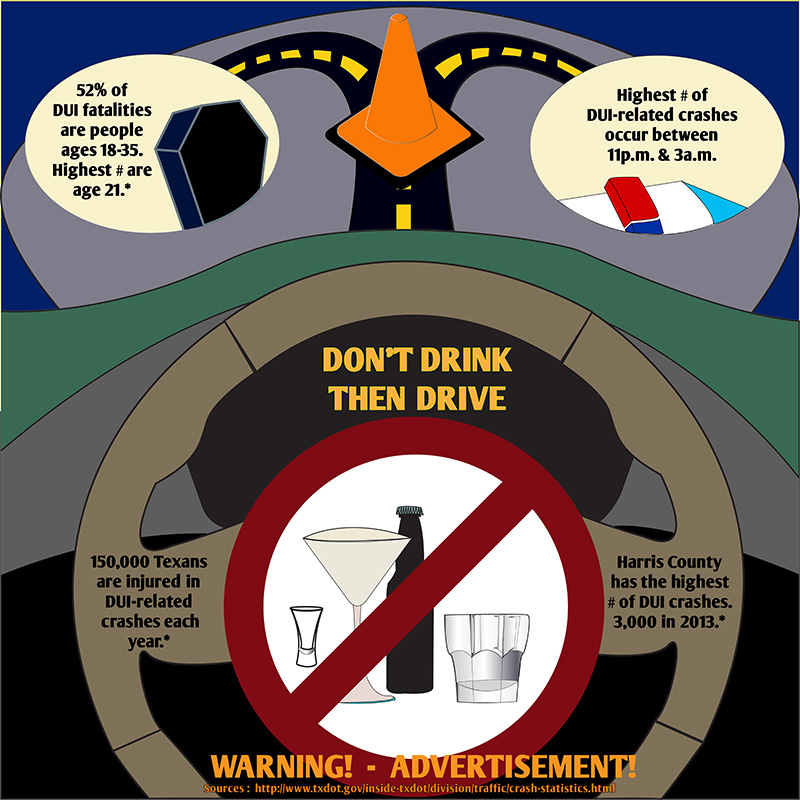
Texas leads nation with highest numbers of DWIs
Mothers Against Drunk Driving (MADD) reports that Texas leads the nation with the highest number of wrecks and fatalities caused by drunk drivers.
MADD’s 2013 collected statistics cite Texas with 1,337 deaths caused by a drunk driver. The death total represents 39.5 percent of all total traffic deaths, a 3.6 percent increase from 2012.
The United States Census Bureau lists Texas as the second largest state and the second most populated with an estimated 26.5 million people. Centers for Disease Control and Prevention (CDC) states 13,138 people were killed in crashes involving a drunk driver in Texas between 2003-2012.
In comparison, Alaska is the largest, but least populated, state with an estimated 735 million people and 222 alcohol related deaths, and California is the third largest, but most populated, state with 38 million people and 10,327 alcohol related deaths between 2003-2012.
A contributing factor to Harris County’s high fatality rate is the limited amount of public transportation for the region’s 4 million residents.
“Drunk driving is a major factor for our city,” said John McNamee, affiliate executive director for MADD Southeast Texas. “Other major metropolitan cities have more public transportation options such as subways and trains. We in the Houston metro area have to use cars to get almost everywhere.”
The National Highway Traffic Safety Administration’s (NHTSA) Fatality Analysis Reporting System 2012 report concluded that people aged between 21-34 were most affected (per 100,000 population). Rate of deaths by gender in Texas confirmed 5.2 percent were male and 2.4 percent were female.

UHCL Police Chief Paul Willingham contributes Houston’s high rate of DWIs to poor decision making.
“A lot of people think they are immune to the effects of alcohol in their system, but even if you appear fine, your motor skills are impaired and your reaction time slower,” Willingham said.
The chief points out there is a higher occurrence of drunk driving during holidays, all holidays in general, but Memorial Day, Independence Day and New Years Day specifically seem to provide the most concerns.
There is also a higher number of incidents involving drunk driving during spring break, however not necessarily by college students.
“Many younger college students tend to make bad decisions associated with youth and inexperience, but statistics bear that drunk driving is not an exclusive college issue,” Willingham said. He speculates that there are far more non-college citizens being arrested for DWI than college students.
UHCL will be celebrating spring break March 16-20.
“Although we have added freshman and sophomore classes, the average age at UHCL is still hovering around 30,” said David Rachita, interim dean of students. “A majority of our students are working either full-or part-time and have major life responsibilities. My informal guess is that many of our students are busy during ‘spring break.’ Though I am sure our students do travel during the break, I have never heard stereo-typical spring break stories.”
Darlene Biggers, associated vice president of student services, advises students to drink responsibility and in moderation.
“Always have a non drinker in your group who can be the designated driver and can tell you when you have had too much,” Biggers said. “Colleges report many serious consequences for binge drinking including acts of vandalism, sexual assaults, death from alcohol poisoning, academic failure, and broken relationships. There can be long term health, mental, social and financial consequences.
Willingham also supports having a designated driver stating it is a true sign of responsibility.
“And treat that person well,” Willingham said. “The designated driver should not have to pay for their food, soda or gas that night.”

Very informative Leena! Thanks for writing about this! I did not know Texas is number one in the nation with the highest number of DWIs.
-Raj